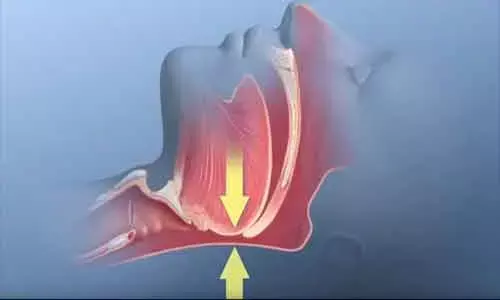- Home
- Medical news & Guidelines
- Anesthesiology
- Cardiology and CTVS
- Critical Care
- Dentistry
- Dermatology
- Diabetes and Endocrinology
- ENT
- Gastroenterology
- Medicine
- Nephrology
- Neurology
- Obstretics-Gynaecology
- Oncology
- Ophthalmology
- Orthopaedics
- Pediatrics-Neonatology
- Psychiatry
- Pulmonology
- Radiology
- Surgery
- Urology
- Laboratory Medicine
- Diet
- Nursing
- Paramedical
- Physiotherapy
- Health news
- Fact Check
- Bone Health Fact Check
- Brain Health Fact Check
- Cancer Related Fact Check
- Child Care Fact Check
- Dental and oral health fact check
- Diabetes and metabolic health fact check
- Diet and Nutrition Fact Check
- Eye and ENT Care Fact Check
- Fitness fact check
- Gut health fact check
- Heart health fact check
- Kidney health fact check
- Medical education fact check
- Men's health fact check
- Respiratory fact check
- Skin and hair care fact check
- Vaccine and Immunization fact check
- Women's health fact check
- AYUSH
- State News
- Andaman and Nicobar Islands
- Andhra Pradesh
- Arunachal Pradesh
- Assam
- Bihar
- Chandigarh
- Chattisgarh
- Dadra and Nagar Haveli
- Daman and Diu
- Delhi
- Goa
- Gujarat
- Haryana
- Himachal Pradesh
- Jammu & Kashmir
- Jharkhand
- Karnataka
- Kerala
- Ladakh
- Lakshadweep
- Madhya Pradesh
- Maharashtra
- Manipur
- Meghalaya
- Mizoram
- Nagaland
- Odisha
- Puducherry
- Punjab
- Rajasthan
- Sikkim
- Tamil Nadu
- Telangana
- Tripura
- Uttar Pradesh
- Uttrakhand
- West Bengal
- Medical Education
- Industry
Diagnosis and management of sleep Apnea in CVD patients: APSC issues consensus statements

Singapore: A review article published in European Cardiology Review reports consensus statements on the diagnosis and management of obstructive sleep apnea (OSA) in patients with cardiovascular disease.
Obstructive sleep apnea is shown to be strongly associated with cardiovascular disease, However, there is a scarcity of evidence supporting this association in the Asain population.
Considering the differences in the epidemiology of CVD and cardiovascular risk factors, as well as differences in the availability of healthcare resources between Asian and Western countries, the Asian Pacific Society of Cardiology (APSC) working group developed consensus recommendations on the management of OSA in patients with CVD in the Asia-Pacific region. The APSC hopes for these recommendations to pave the way for screening, early diagnosis, and treatment of OSA in the Asia-Pacific region.
The consensus recommendations are as follows:
Screening and Diagnosis
Recommendation 1: Any one of the following conditions should prompt the clinician to screen patients for OSA: hypertension, type 2 diabetes, obesity, stroke, heart failure, coronary artery disease, and arrhythmia.
Recommendation 2: Symptoms of OSA or screening questionnaires, such as STOP-Bang, may be used to screen for OSA in patients with CVD.
Recommendation 3: Patients with the following conditions should be referred to a sleep specialist for sleep testing: resistant hypertension, AF requiring cardioversion/ablation; or unexplained pulmonary hypertension.
Recommendation 4: In patients suspected of OSA after screening with significant cardiopulmonary disease (HF, congenital heart disease, or complicated valvular disease), polysomnography (Level I) should be used to diagnose OSA. Level III or Level IV sleep studies should not be used to diagnose OSA in these patients because of the complexity of the clinical scenario, which may lead to misdiagnosis.
Recommendation 5: In patients with a high pre-test probability of moderate to severe OSA without significant cardiopulmonary disease or stroke, home sleep apnoea testing (Level III or IV) or polysomnography (Level I/II) may be used to diagnose OSA.
Recommendation 6: Sleep studies conducted on patients with CVD should be scored and reported by an adequately trained sleep specialist.
Treatment and Referral
Recommendation 7: All patients undergoing OSA treatment should also undergo lifestyle modification and educational and behavioral interventions for OSA, as well as for weight loss if they are classified as overweight or obese.
Recommendation 8: OSA treatment improves daytime sleepiness and cognitive function. In observational studies, continuous positive airway pressure (CPAP) therapy for OSA is strongly associated with reduced rates of adverse cardiovascular events, but randomized control trial evidence to support CPAP therapy in non-sleepy OSA patients with CVD is inconclusive.
Recommendation 9: Patients with HF and OSA may undergo CPAP therapy, which has been shown to improve ventricular function, symptoms, and quality of life.
Recommendation 10: Patients undergoing rhythm control for AF who have moderate to severe OSA should undergo CPAP therapy to reduce the risk of AF recurrence.
Recommendation 11: Patients with CVD and OSA whose OSA symptoms persist despite treatment or who are non-adherent to OSA therapy should be reviewed by a sleep specialist.
The APSC Working Group concluded, "Management of patients with CVD and OSA should be individualized and should consider the patient's symptoms, clinical characteristics, and comorbidities, as well as patients' and caregivers' concerns and preferences."
"Also, clinicians should be aware of the challenges that may limit the applicability of these consensus recommendations, such as limited access to specific interventions and technologies, limited availability of resources, accepted local standards of care, cultural factors, and individualized expertise in OSA management."
Reference:
Jack Wei Chieh Tan, Leong Chai Leow, Serene Wong, See Meng Khoo, Takatoshi Kasai, Pipin Kojodjojo, Duong-Quy Sy, Chuen Peng Lee, Naricha Chirakalwasan, Hsueh-Yu Li, Natalie Koh, Adeline Tan, Thun How Ong, Aye Thandar Aung, Song Tar Toh, Chi-Hang Lee, Asian Pacific Society of Cardiology Consensus Statements on the Diagnosis and Management of Obstructive Sleep Apnoea in Patients with Cardiovascular Disease, European Cardiology Review 2022;17:e16.
https://doi.org/10.15420/ecr.2021.59
Dr Kamal Kant Kohli-MBBS, DTCD- a chest specialist with more than 30 years of practice and a flair for writing clinical articles, Dr Kamal Kant Kohli joined Medical Dialogues as a Chief Editor of Medical News. Besides writing articles, as an editor, he proofreads and verifies all the medical content published on Medical Dialogues including those coming from journals, studies,medical conferences,guidelines etc. Email: drkohli@medicaldialogues.in. Contact no. 011-43720751


